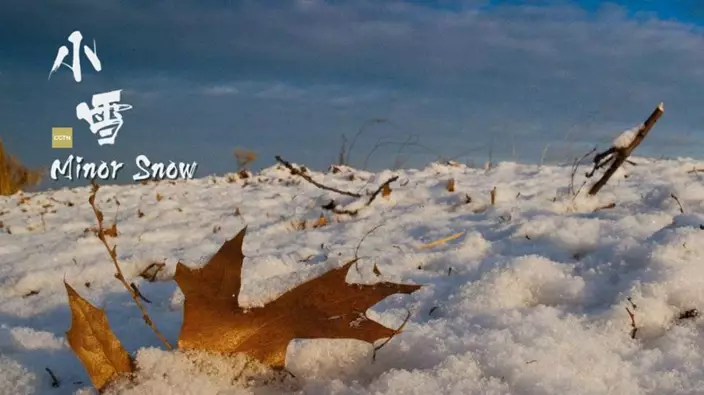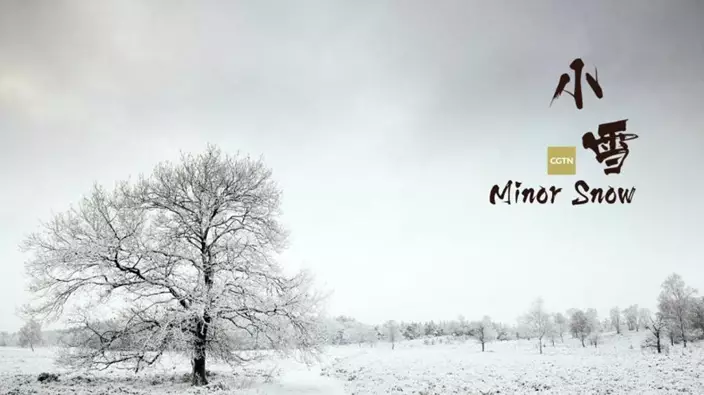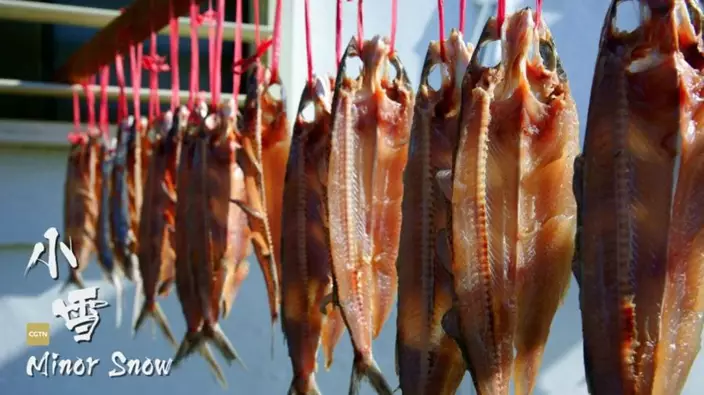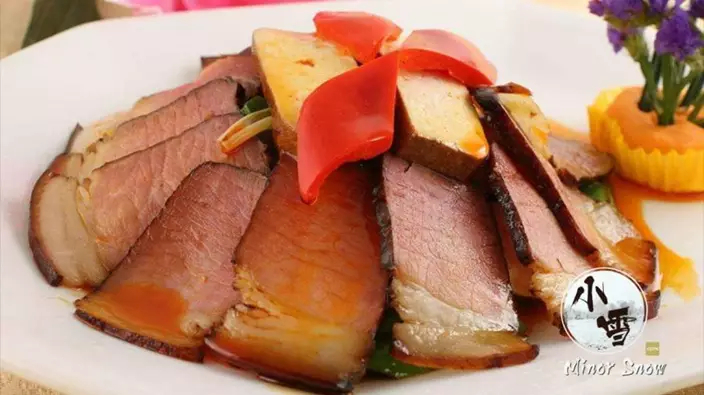A cold front has recently swept across China, driving out the lingering mildness of the
previous season while kicking off the second solar term of the winter.

Photo/CGTN
The Xiaoxue, or Minor Snow in English, started on Wednesday, in the wake of a new round of
temperature plummeting from seven to 20 degrees Celsius.
It is the 20th of the 24 solar terms in the Chinese lunar calendar, which usually refers to the period of time from November 22 to December 7. During this time, the northwest wind usually frequents the Chinese territory, with the temperature of many areas falling below zero.
Frozen earth, a sign of a fruitful coming year

Photo/CGTN
An ancient Chinese saying goes like “Minor Snow freezes the earth and Major Snow freezes the river.” During this time, the earth in northeast China would usually be frozen to the depth of at least 10 centimeters, which makes farm work almost impossible.However, it does not mean that the freezing cold is not welcomed. The ancient Chinese believe that snowy weather of the Minor Snow signifies a big harvest in the coming year,
and they actually had scientific support.
The snowy weather is usually the prelude of abundant rainfalls for the next year, while the snow will kill some harmful insects and bacteria and at the same time accelerate the organic decomposition – both are necessities for fertilizing the fields.
Orchard farmers will trim their trees during the time, while in most areas of China, people have the tradition of piling up Chinese cabbages in storage for the coming winter. It is one of the favorite vegetables of the Chinese people.
Keep out the coldness and keep in the warmth

Photo/CGTN
During the agrarian age, people would usually be held indoors by the whistling wind at this time of year. But even though, it is highly recommended by doctors to keep ventilation, especially when the heating system in the North has started to work.
The Chinese medicines also suggested that the indoor temperature should be kept below 20 degrees Celsius, and it is time to turn on the humidifiers.
It is also when the South started their long-standing discussion about whether they should have the same heating systems like the North since it is time they start to prevent chilblains from their hands and feet.
Store food for the coming winter

Photo/CGTN
It seems the Chinese just never let go of any chance to enjoy delicious food. In the north, people eat hotpot and mutton, which are believed warm and nutritious. Besides, sitting around the steaming pots with family and friends could easily create a warm atmosphere.
In many areas of China, people start to make cured meat during this time of year. Slice the meat into pieces and dry them in the wind, the meat would be preserved for a long time. Before the refrigerator was invented, this measure could help to diversify the dinner tables for the coming holidays.
It is out of the same reason that the coastal residents to dry fishes to get prepared for the winter.

Photo/CGTN
In some southern provinces, people have the tradition of eating "Ci Ba", a kind of dessert made of sticky rice. In the past, people use the dessert as an offering to the god of cow.
Though delicious, it is better not to eat much, for they could not be easily digested.The winter is in dominance, but it does not necessarily mean that people should be confined at home. A little bit sports could be more beneficial to health than any nutrition.
HOUSTON (AP) — The Golden State Warriors struggled on both ends of the court Wednesday night to squander a chance to close out their first-round playoff series against the Houston Rockets.
Things got away from them quickly in the 131-116 loss in Game 5. Stephen Curry, Jimmy Butler and the rest of Golden State’s starters spent most of the second half watching from the bench after coach Steve Kerr inserted his reserves with about five minutes left in the third quarter and Houston up by 29.
Kerr shouldered the blame for the poor performance that allowed Houston to move the best-of-seven series to 3-2.
“I didn’t have them ready to play, clearly,” he said. “We committed three fouls in the first two minutes of the game and I think they were 13 for 13 from the line after the first quarter.
“We can’t come out with that lack of defensive focus and energy and expect to beat a great team on their home floor in a close-out game,” he continued. “They took it to us, they were awesome tonight and we’ve got to be better.”
He said Houston’s success on offense early made it difficult for Golden State to get anything going.
“We were out of sorts from the beginning, especially defensively, and I think that carried over to our offense,” he said. “It’s hard to play offensively when you’re taking the ball out of the net every single play.”
It was clear to Kerr at halftime that this was not going to be the Warriors' night.
“I think at halftime, their effective field goal percentage was 95%,” he said. “I’ve never seen that in my life. You’re not winning that game.”
Butler managed just eight points in 25 minutes on 2-of-10 shooting after combining for 52 points in the two full games he’d played in this series.
Curry was 4 of 12 for 13 points after scoring more than 30 points in two of the first four games to move the Warriors within a game of clinching the series.
Curry had his right thumb wrapped during the game and had a bag of ice taped on it afterward. It appeared to be swollen in a picture circulating online of him walking to the team plane.
Asked about the state of his thumb, he answered with one word.
“Cold,” he said.
When pressed, he provided a few more details.
“I don’t even know how to answer it,” he said. “Something you are dealing with and keep it moving as long as I can play. I’ve got it wrapped for a reason.”
He was emphatic when asked if it was impacting his game.
“No,” he said. “None. No.”
Houston’s Dillon Brooks was asked about the Golden State broadcast team suggesting that he’s targeting Curry’s thumb by swiping at it.
“If I had an injured ankle, I would attack that ankle every single time,” he said. “So, whatever they’re saying on the broadcast, they can keep saying it.”
Kerr praised his backups for bringing an energy the team will need to rediscover in Game 6, which is Friday night in San Francisco.
Reserve Moses Moody led the Warriors with 25 points. Golden State’s 76 bench points were the most in a playoff game for the franchise since 1970-71, when starters began being tracked.
“Houston was great and they took it to us right away,” Kerr said. “But like I said, it was an important finish.”
AP NBA: https://apnews.com/NBA

Warriors head coach Steve Kerr instructs his players in Game 5 of the First Round of the NBA Playoffs against Houston Rockets at Toyota Center in Houston, Texas on Wednesday, April 30, 2025. (Carlos Avila Gonzalez/San Francisco Chronicle via AP)

Dillon Brooks (9) goes up to defend against a 3-point shot by Stephen Curry (30) in the first half as the Golden State Warriors played the Houston Rockets in Game 5 of the First Round of the NBA Playoffs at Toyota Center in Houston, Texas on Wednesday, April 30, 2025. (Carlos Avila Gonzalez/San Francisco Chronicle via AP)

Jimmy Butler (10) passes to a teammate from under the basket in the first half as the Golden State Warriors played the Houston Rockets in Game 5 of the First Round of the NBA Playoffs at Toyota Center in Houston, Texas on Wednesday, April 30, 2025. (Carlos Avila Gonzalez/San Francisco Chronicle via AP)

Stephen Curry (30) walks off the court after the Golden State Warriors lost to the Houston Rockets in Game 5 of the First Round of the NBA Playoffs at Toyota Center in Houston, Texas on Wednesday, April 30, 2025. (Carlos Avila Gonzalez/San Francisco Chronicle via AP)

Brandin Podziemksi (2), Jimmy Butler (10) and Stephen Curry (30) react on the bench in the final seconds of the second half as the Golden State Warriors played the Houston Rockets in Game 5 of the First Round of the NBA Playoffs at Toyota Center in Houston, Texas on Wednesday, April 30, 2025. (Carlos Avila Gonzalez/San Francisco Chronicle via AP)




























































